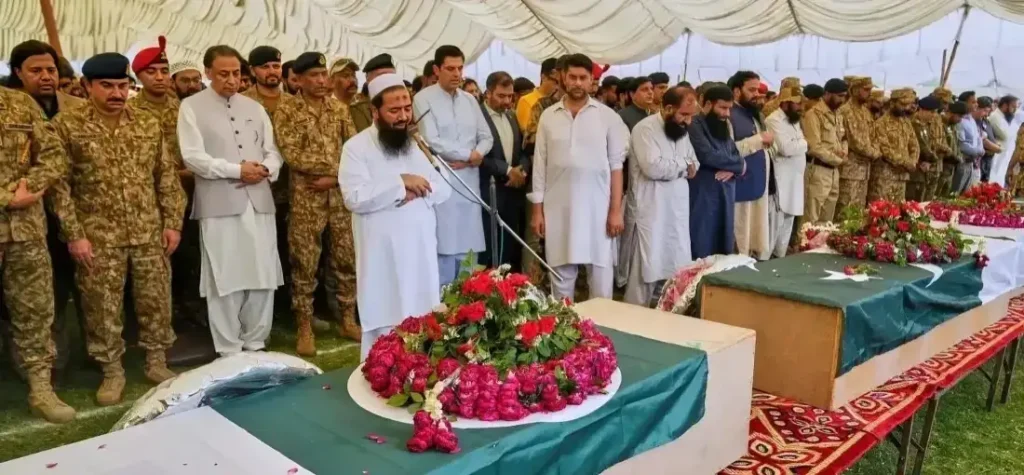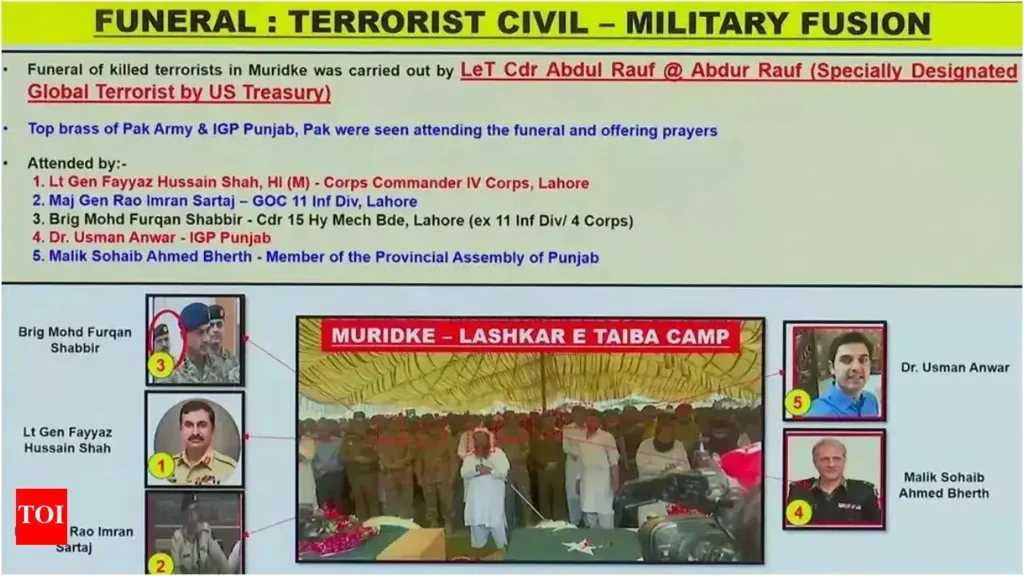India Names Pakistani Officers at Terrorist Funerals After Operation Sindoor Kills Over 100 Militants
In a bold diplomatic step, India has identified several Pakistani military and intelligence officers who reportedly attended the funerals of terrorists eliminated during Operation Sindoor. This revelation adds weight to India’s long-standing claim that Pakistan continues to support terrorism in Kashmir.

Operation Sindoor: A Swift and Strategic Retaliation
Indian forces launched Operation Sindoor after a deadly terror ambush in Pahalgam, Jammu and Kashmir. Heavily armed militants attacked a security convoy, resulting in multiple casualties and sparking outrage across the country.
In response, Indian forces acted swiftly. Over several days, they targeted and dismantled terror hideouts along the Line of Control (LoC) and in Kashmir’s interior. Officials confirmed that Indian troops killed more than 100 terrorists, including foreign fighters who had crossed over from Pakistan.

The military used drones, satellite imaging, and ground intelligence to locate key targets and carry out precise strikes. This coordinated effort struck at the core of several terror networks operating in the region.
Pakistani Officers Spotted at Funerals of Militants
Following the operation, Indian intelligence gathered strong evidence that Pakistani officers attended funerals held for the killed terrorists. The funerals reportedly took place in areas of Pakistan-occupied Kashmir (PoK), such as Muzaffarabad and Kotli—locations known to host terror training facilities.
According to Indian officials, video footage, intercepted calls, and surveillance data identified multiple officers from Pakistan’s Inter-Services Intelligence (ISI) and military. These individuals didn’t attend in a personal capacity. Their presence signaled the strategic importance Pakistan placed on the slain militants.
A senior Indian official noted, “These weren’t low-level recruits. Pakistan gave them state recognition, and their handlers openly participated in the ceremonies.”
India Shares Names with Global Allies
While the full list of names remains classified, India has already shared the intelligence with key allies including the United States and European nations. The list reportedly contains names of both active and retired personnel known for their past links to terror groups like Lashkar-e-Taiba, Jaish-e-Mohammed, and Hizbul Mujahideen.
“These aren’t anonymous men in uniform. They’ve supported cross-border attacks for years and now openly mourn the loss of assets used against India,” a senior Indian security source explained.
By identifying these individuals, India aims to shift the global narrative and push for stronger action against state-sponsored terrorism.
Pressure Mounts on Pakistan
This new evidence puts Pakistan under renewed global pressure. For years, Pakistan has denied any role in aiding terrorism and claimed it supports only the political aspirations of the Kashmiri people. But incidents like this undercut those claims.
India has updated its latest dossier to the United Nations and the Financial Action Task Force (FATF), urging them to take note of the direct link between Pakistan’s military establishment and terrorist groups.
“These aren’t rogue actors. They’re part of a larger, organized structure. The world must hold such states accountable,” one Indian diplomat stated.
National Reactions and Political Statements
The revelations have triggered strong reactions within India. Prime Minister Narendra Modi praised the armed forces, calling their response “decisive and courageous.” He reiterated that India would never tolerate terrorism and would respond to attacks with full force.
Defence Minister Rajnath Singh described Operation Sindoor as a “surgical success” that sent a clear message to India’s enemies. “Anyone who plots against India will face the consequences,” he asserted.
Opposition leaders also backed the operation. However, some urged the government to strengthen internal intelligence and review security protocols in Kashmir to prevent future attacks.
A Shift in India’s Strategy
India’s move to name Pakistani officers marks a change in approach. In the past, India avoided direct accusations against individuals in Pakistan’s establishment. Now, the government has adopted a more assertive strategy that includes public naming, diplomatic briefings, and international outreach.
“This isn’t just about punishing terror groups anymore. India is targeting the ecosystem that enables them,” a strategic affairs analyst noted.
The decision to go public not only exposes Pakistan but also challenges the international community to respond. India is essentially asking, “How long will you turn a blind eye?”
Regional Impact and Future Implications
The aftermath of Operation Sindoor could reshape India-Pakistan relations. As New Delhi strengthens its military and diplomatic posture, Islamabad may face greater scrutiny from global powers.
Intelligence officials believe these developments will disrupt terror networks in the short term and force Pakistan to rethink its proxy strategies. However, experts caution that sustained international pressure remains key to long-term change.
Conclusion
By eliminating over 100 terrorists and revealing the names of Pakistani officers who honored them, India has made a powerful statement. The message is clear: terrorism and those who support it—whether openly or in the shadows—will face consequences.
As India ramps up its global engagement on this issue, the world must now decide whether to continue tolerating double standards or stand united against state-backed terrorism.






